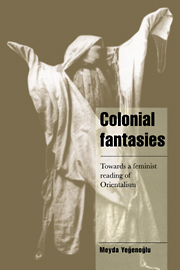Book contents
- Frontmatter
- Contents
- Acknowledgment
- Introduction
- 1 Mapping the field of colonial discourse
- 2 Veiled fantasies: cultural and sexual difference in the discourse of Orientalism
- 3 Supplementing the Orientalist lack: European ladies in the harem
- 4 Sartorial fabric-actions: The Enlightenment and Western feminism
- 5 The battle of the veil: woman between Orientalism and nationalism
- Notes
- Bibliography
- Index
5 - The battle of the veil: woman between Orientalism and nationalism
Published online by Cambridge University Press: 22 October 2009
- Frontmatter
- Contents
- Acknowledgment
- Introduction
- 1 Mapping the field of colonial discourse
- 2 Veiled fantasies: cultural and sexual difference in the discourse of Orientalism
- 3 Supplementing the Orientalist lack: European ladies in the harem
- 4 Sartorial fabric-actions: The Enlightenment and Western feminism
- 5 The battle of the veil: woman between Orientalism and nationalism
- Notes
- Bibliography
- Index
Summary
Nationalism … seeks to represent itself in the image of the Enlightenment and fails to do so. For Enlightenment itself, to assert its sovereignty as the universal ideal, needs its Other; if it could ever actualize itself in the real world as the truly universal, it would in fact destroy itself.
Partha Chatterjee, Nationalist Thought and the Colonial WorldNationalism as Orientalism and the question of gender
Whenever I evoked, in various scholarly meetings and conversations in the US, the power of Orientalism to understand the place the veil occupies in such constructions I have consistently encountered the somewhat suspicious remark as to whether, by locating the question of the veil within the problematic of Orientalism, I am not overlooking the question of Muslim women's oppression at “home” by Islam and indigenous patriarchy. Such remarks are usually followed by a set of questions which demand that I deliver the “truth” about women in Muslim societies, the conditions under which they live, and so on. In other words, what the Western audience desires to hear is the native's own voice, the true and authentic story of the situation of women in Muslim societies, as opposed to the negative Orientalist stereotypes. This liberal desire to turn me into a native informant and thereby re-value the weak and the subjugated is the very gesture by which the sovereign Western subject constructs himself/herself as considerate and benevolent.
- Type
- Chapter
- Information
- Colonial FantasiesTowards a Feminist Reading of Orientalism, pp. 121 - 144Publisher: Cambridge University PressPrint publication year: 1998

